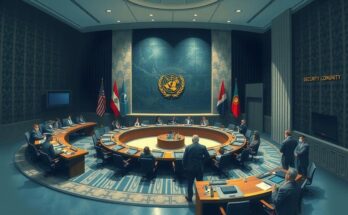The North Kivu region in the DRC is witnessing a surge in violence as M23 rebels, backed by Rwanda, advance towards Goma. Government forces, supported by Burundian troops and international missions, are engaged in fierce battles over strategic locations. The situation has led to mass displacements and a worsening humanitarian crisis, prompting significant concern from authorities, including calls for urgent meetings to address the crisis.
The North Kivu region of the Democratic Republic of Congo is experiencing a significant escalation of violence due to intense confrontations between Congolese armed forces and M23 rebels, who are reportedly supported by Rwandan soldiers. Government forces receive backing from Burundian troops, members of SAMIDRC, the UN peacekeeping force MONUSCO, and local militias known as Wazilendo. The fighting has notably impacted towns close to Goma, prompting a humanitarian crisis as displaced persons seek refuge in the city.
M23 rebels have successfully captured key towns such as Mumbambiro and Sake, bringing them within 30 kilometers of Goma. Recent battles have targeted crucial routes including Sake-Kirotshe and Sake-Kitshanga. Due to ongoing conflict in Sake, many displaced individuals are fleeing towards Goma, which is already experiencing a dire humanitarian situation. The violence has now spread to Nyiragongo territory, close to Goma, leading to evacuations of internally displaced persons from nearby camps.
Reports of contradictory information regarding the situation are proliferating, particularly surrounding the supposed assassination of North Kivu’s military governor, Péter Cirimwami. While partisan media sources claim he has been killed, government representatives deny these allegations, and no official confirmation has surfaced. The political faction of M23 has publicly requested that SAMIDRC and MONUSCO refrain from supporting Congolese forces, declaring their intention to move forward to Goma for purported goals of peace and stability.
In response to this escalating crisis, President Félix Tshisekedi urgently convened meetings with key defense and interior ministers upon his return from Davos. On January 24, an extraordinary session of the High Council of Defense was held to discuss strategies for addressing the conflict. Concurrently, Turkish President Recep Tayyip Erdogan expressed his willingness to facilitate mediation efforts between Rwanda and the DRC in hopes of resolving the ongoing issues.
The North Kivu region has been a hotspot of armed conflict and instability, primarily attributed to the activities of various militia groups such as the M23. The area is often characterized by fluctuating power dynamics involving local and regional actors, including foreign military interventions. The involvement of Rwandan support for M23 and the complexities of the DRC’s internal struggles has perpetuated a cycle of violence, significantly affecting the humanitarian landscape for civilians caught in the crossfire. Goma, as the capital of North Kivu, is particularly vulnerable as fighting intensifies within proximity to the city.
In summary, the current escalation of violence in North Kivu poses severe risks not only to the security of the region but also to the humanitarian situation for displaced populations. The interplay between local armed forces, regional military involvement, and political strategies adds layers of complexity to the conflict. President Tshisekedi’s urgent measures reflect the critical nature of the crisis, while international mediation attempts indicate potential pathways for conflict resolution, although the outlook remains uncertain.
Original Source: www.fides.org




